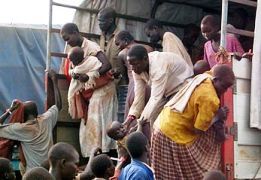$20 million for emergency programmes in South Sudan
Nov 29, 2005 (NAIROBI) — The Multi-Donor Trust Fund (MDTF) for Sudan has signed an agreement with the southern government to disburse US $20 million for emergency programmes in the region, where a 21-year civil war left two million people dead.

|
|
Sudanese refugees arriving at Kyangwali settlement in Uganda. |
“On Friday, we [the World Bank and the southern Ministry of Finance] signed a grant agreement in Juba [the capital of southern Sudan] for an emergency package for south Sudan,” Ishac Diwan, World Bank country director for Ethiopia and Sudan, said on Saturday in Nairobi.
“This is the first MDTF money that is being disbursed in Sudan,” he added.
The MDTF, which pools resources from various donors into one common fund, is administered by the World Bank with an oversight committee that includes Sudanese authorities, the United Nations and major donors.
It will provide harmonised funding for priority areas that have been identified by the governments of national unity and southern Sudan.
“It is a unique collaboration between the World Bank, the two Sudanese governments, the donors and the United Nations,” Diwan noted.
“It aims to avoid the so-called ‘donor circus’, where every donor wants to plant its own flag on a project, resulting in gaps in coverage,” he explained. “It also tries to build the capacity in governments, rather than go through NGOs.”
The emergency package totalling $27 million – with $20 million coming from the MDTF and $7 million from the southern Sudan government – will be used for books, medication, equipment for the new government offices in Juba and the 10 southern states, and the services of an international company to handle procurement.
“All the development contracts of the government of Sudan will be transparent, and government procurement will be done according to World Bank procedures,” Diwan noted.
In addition, three programmes – one in the south and two in the north – have been prepared for agreement in December, he added, while budgets and priorities for programmes to be implemented in 2006 have been set.
A $150 million programme for the south, two-thirds of which would be funded from the government’s own resources, would focus on infrastructure development and urban rehabilitation.
The MDTF strategy in the north, Diwan added, would focus on assisting the poor and on decentralisation. The initial $20 million programme would focus on community development in war-affected areas.
Priority areas for 2006 will include disarmament, demobilisation and reintegration; national transport; food security; capacity building in health and education; and rural development.
During the Oslo donor conference for Sudan in April, the Netherlands made the largest initial pledge to the fund ($195 million), followed by Norway ($100 million) and the UK ($80 million).
Of those pledges, however, the MDTF had only received $102 million in cash so far.
The southern government had chosen a broad development strategy to achieve progress across the region, Diwan noted.
Southern Sudan lags behind the rest of the country in terms of institutional capacity and socioeconomic development, with key education and health indicators among the worst in the world.
During Sudan’s six-year interim period, which began on 9 July, the emphasis would shift from humanitarian assistance to recovery – focusing on the consolidation and extension of peace – to long-term development.
After the interim period, the south will hold a referendum to decide whether to remain part of a united Sudan or secede.
(IRIN)
